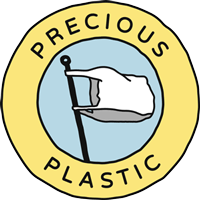
This article is part of Precious Plastic, a One Army project tackling the plastic waste problem. You can learn more
here.
When you first get 300.000€ seems like a lot. Even writing it down is a challenge, three-hundred-thousands Euro. Or at least seems a lot to us. But as things start rolling, you quickly realise how fast money gets spent, especially during research and development.
We like to stay as transparent as possible with everything, including our finances. Open source finances one might say! Below we’ll cover a few aspects, data and infographics of the Precious Plastic Version 4 Financial Report. You can also download the full report here if you’re interested.
Key Points
– Version 4 development ran from July 2018 to January 7th 2020
– The funding came from Famae foundation as part of their “Don’t Trash Your Cash” 2018 challenge. Precious Plastic was awarded 300,000 euro as a winner of this award.
– There was one staff member paid (Mattia) to help develop Version 4, but everyone one else who worked on it was a volunteer (100+ people contributed). Dave was paid with Patreon.
– Precious Plastic provided food and housing in exchange for people who came to Eindhoven to volunteer their time and skills.
How We Spent The Money
As expected most money was spent in the workspace category. A total of 93.000€ or about 29% of the total budget. Developing machines cost quite some money (and time). Tools, machines, materials and machining jobs all tend to be quite pricey. And we made ourselves a little present buying a robot arm to research automatic sorting, that alone cost 15.000€.
Second up was the kitchen with about 43.000€. Feeding 40+ people over a period of time of more than 18 months quickly adds up. Particularly if, like in our case, you decide to purchase as much organic and local food as possible (refusing to support damaging food systems).
Third was living with 32.000€. Living cost includes paying rent for the 10+ due-to-be-demolished houses (15.000€) and the electricity and gas bills associated with them. Remarkably cheap if you think that average rent in Eindhoven is 500-600€ per month per person.

How We Improved Over Time
First few months were a little chaotic as our team went from 3 people to 40. We had no experience scaling. We had to learn a lot. Also these were the setup months, where more money went into setting up the infrastructure. Houses, furnishing, kitchen, workspace, tools, materials and more. We had financial plans, forecasts and area budgets but were difficult to follow.
By March 2019 we had set up area managers (workspace, design, kitchen etc..) with respective budgets to follow. This was a turning point where finances started to make more sense and get under control.

Plus Patreon
Alongside the grant, we also used money from the ongoing Patreon support of almost 500 people. Money that was absolutely crucial when waiting for liquidity as these grant money tends to be rather slow and full of paperwork. If you are in a position to help consider joining these 470-something people supporting our work to make sure we can continue to fight plastic waste with more resources.
Conclusions
Considering our inexperience and experimental approach trying new things we think it is a success that we managed to stay within budget. Quite precisely. There were times where we were quite anxious and doubted but thanks to all the volunteers’ cooperation and a few key decisions everything worked out pretty good. And if you consider the extracted value from the 300.000€ I doubt we could have done any better.
Let us know your thoughts in the comments.
Ciao from Mattia!





.svg)

